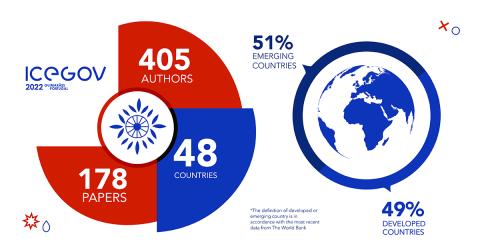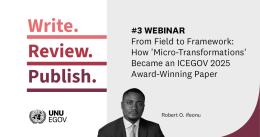Fifteen years after its first edition - 2007, Macau - the United Nations University's flagship conference on Digital Governance keeps its strong momentum. After a 16-weeks long Call for Papers and Workshops, the figures from the submission process are now available and show a leap forward compared to the previous year, where COVID-related restrictions meant fewer overall submissions.
This year's theme - Digital Governance for Social, Economic, and Environmental Prosperity - targeted authors and practitioners from all sectors to submit their latest research and short papers while also obtaining a fair number of workshop proposals along the way. Over the next 5 weeks, a rigorous double-blind peer-review process will ensure the best papers and workshops are accepted and presented later this year in Guimarães, Portugal, on 4-7 October 2022.

Papers and Tracks
A total of 178 papers were submitted for the 11 Tracks, of which the majority were research papers, a usual trend for the conference. However, a significant number of ongoing research papers also made it through. Limited to just two tracks - Industry and Public Sector and Poster Exhibition - short papers were less this time around, but still showing that while ICEGOV is primarily an academic conference, it also successfully targets non-academic fields.
- Research papers: 88 (49%)
- Ongoing research papers: 61 (34%)
- Short papers: 29 (16%)
As for the tracks, Track 4: Digital transformation and innovation of public services and governments saw the biggest amount of submissions (34 papers), followed by Track 6: Digital governance measurement, assessment, and monitoring (30 papers) and Track 5: Open government, civic participation, and engagement (26 papers). The remaining tracks showed a good balance of submissions, including themes as diverse as frontier technologies, smart cities and regions, privacy, security, and legal informatics, amongst others. The Doctoral Colloquium, targeted at PhD students, received doctoral 12 submissions
Authors
Looking at the authors, a total of 405 submitted their work for this year's conference, which averages 2.3 authors per paper. Universities and research centres represent, as is usual, the majority of submissions, while government officials and international organisations, mainly from the United Nations system and the European Union, represent a fair slice. The remaining are split between industry and civil society.
- Academia: 321 (79%)
- Government: 44 (11%)
- International Organisations / NGOs: 19 (5%)
- Industry: 14 (3%)
- Other / Civil Society: 7 (2%)
Countries
The balance between developing and emerging countries - according to the latest data from The World Bank -saw a small shift towards the emerging countries and a very balanced number at the end: 205 authors (51%) are from emerging countries and 200 authors (49%) are from developed countries. Nonetheless, of the 48 countries in total, 29 are developed and are 19 emerging. This year, Oceania was left out as no submissions came from that side of the planet. Still, ICEGOV received submissions from Europe, Asia, Africa, and the Americas.
Europe topped the charts with 212 authors (52%), while Asia and the Americas followed behind with 109 and 73 authors (27% and 18%, respectively). Africa represented 3% of all submissions (11 authors). Finally, the top five of authors (country-wise) is shown below. Portugal, in first place, comes as no surprise, given that it is the host country of ICEGOV 2022.
- Portugal: 49 (Europe) [host]
- Brazil: 46 (Americas)
- India: 46 (Asia)
- China: 37 (Asia)
- Russia: 28 (Europe)
Workshops
As for the workshops, which will take place on 7 October, a total of 13 proposals were submitted. Of these, eight will make it to the conference programme.
Seven proposals came from academia, from countries such as Norway, Portugal, India, United States, Brazil, and Estonia. International organisations also submitted four proposals, including the European Commission, UNESCO, UNDESA, and The World Bank. Finally, government agencies from Canada and Portugal also submitted one proposal each.



